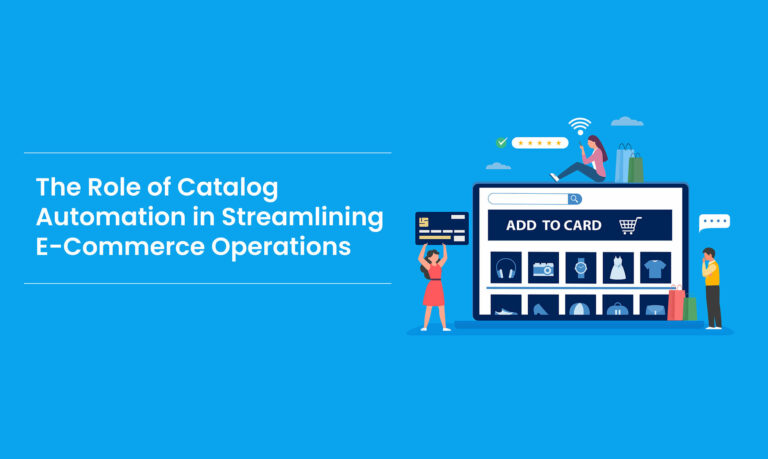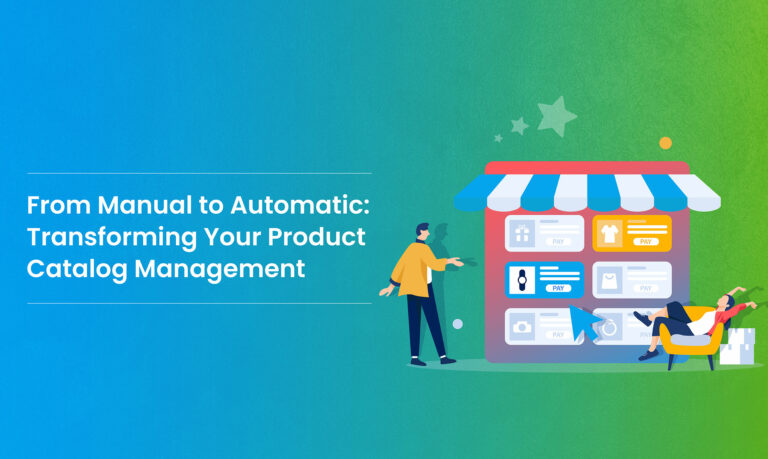Introduction
Within the rapidly evolving realm of e-commerce, companies are seeking clever methods to streamline operations and increase customer satisfaction with their offerings. It resembles a large-scale online competition in which participants are vying for attention. This is where cataloging automation, a hip, cutting-edge technology, enters the picture. This blog aims to explain the significance of cataloging automation in the online business arena. We will discuss essential tips on how to select the right cataloging automation tools and the ways in which they are transforming the landscape for many industries.
Overview of Cataloging Automation
When we discuss online shopping cataloging, we are essentially discussing how we arrange and present product details. Previously, this was done by hand, which required a great deal of time and extreme caution to get everything just perfect.
But well, what do you know? Introducing cataloging automation: a sophisticated technology that saves us all the effort. With the use of technology, online shopping may be completed more quickly and effectively than spending hours doing it by hand.
The Importance of Catalogs in E-Commerce
Elevated User Experience: A seamlessly organized and informatively rich product catalog serves as the portal to an uninterrupted user experience. Customers heavily depend on lucid and concise product information to make well-informed purchasing decisions.
Search Engine Optimization (SEO): Search engines favor well-organized data. A meticulously cataloged e-commerce website stands a higher chance of securing prominent positions in search engine results, thereby amplifying visibility and drawing in potential customers.
Uniformity Across Channels: E-commerce entities often function across diverse platforms – their official website, third-party marketplaces, social media channels, and more. Ensuring catalog consistency across these channels is paramount for maintaining brand integrity and instilling trust in customers.
Streamlined Inventory Management: The accuracy of cataloging is the linchpin of effective inventory management. It guarantees businesses real-time insights into product availability, mitigating issues like overselling or stockouts that could potentially tarnish customer experiences.
Game-Changing Impact of Cataloging Automation
Let’s dig into how cataloging automation is changing the game in the world of online shopping.
1. Fast and Smooth:
Cataloging automation speeds up the process of adding, updating, and managing product info. What used to take hours or even days can now be done in minutes. This quick turnaround is super important in the fast-moving world of online shopping, where trends and what customers like can change really quickly.
2. No Mistakes, Just Perfection:
With automation, there’s no room for mistakes that can happen when people do things manually. Whether it’s product names, details, or prices, automated systems make sure everything in the catalog is consistent and accurate. This not only makes customers happy but also stops businesses from making costly errors.
3. Grow Without Limits:
As businesses get bigger, they start offering more and more products. Doing cataloging by hand becomes tough and takes a lot of time when there are tons of products. Cataloging automation lets businesses grow smoothly without sacrificing the quality and accuracy of their product info.
4. Always Up-to-Date:
Product details can change – prices, availability, and specifications might be different today than yesterday. Cataloging automation keeps things up-to-date in real-time, making sure customers always see the latest and most accurate info. This is especially important for businesses with a big and diverse range of products.
5. Everywhere You Look:
Online shopping isn’t just about one website anymore. Businesses sell stuff on different platforms like their own site, Amazon, eBay, and more. Cataloging automation tools can work seamlessly with all these platforms, making sure product info stays the same everywhere.
Selecting the Right Cataloging Automation Tools
Choosing the correct tools is the linchpin for the success of cataloging automation in the dynamic world of e-commerce. To navigate this crucial decision, consider the following key considerations when selecting automation solutions tailored for e-commerce cataloging:
1. Scalability
The first and foremost consideration is scalability. A robust automation tool should seamlessly handle both the current volume and diversity of your product catalog and anticipate future growth. It should be agile enough to accommodate an expanding business landscape without compromising efficiency.
2. Integration Capabilities
Look for automation tools that effortlessly integrate with your existing e-commerce platforms, ERP systems, and other relevant software. Compatibility is paramount to a smooth and successful implementation. The selected tool should be capable of harmonizing operations across various channels, ensuring a unified and cohesive e-commerce ecosystem.
3. Customization Options
Recognizing that every e-commerce business is distinct, opt for automation tools that offer robust customization options. The tool should allow for flexible adaptations to align with your specific cataloging requirements and workflows. A one-size-fits-all approach may not suffice, and the ability to tailor the tool to your unique business needs is critical.
5. Maintenance and Support
Consider the ongoing support and maintenance provided by the developers of the chosen automation tool. A reliable solution goes beyond its initial implementation. Regular updates, responsive customer support, and a robust knowledge base are indicative of a solution that stands the test of time. The developers’ commitment to continuous improvement and addressing user concerns reinforces the reliability of the chosen tool.
In essence, selecting the right cataloging automation tools involves a holistic evaluation that goes beyond immediate needs.
The Future of Cataloging Automation in E-Commerce
As technology keeps getting cooler, the future of cataloging automation in online shopping is filled with some really interesting stuff. Let’s talk about a couple of things you might want to know:
Smart Computers (Artificial Intelligence or AI):
You know how your phone gets smarter with time? Well, cataloging automation is getting a brain boost too. They’re using fancy algorithms and smart learning (like your phone does) to organize products better, suggest improvements, and even guess what you might like to buy.
Virtual Shopping Adventures (Augmented Reality or AR):
Ever wished you could try things out before buying them online? Well, cataloging automation might soon let you do just that. With AR, you can see how a product looks in your space before deciding to buy. It’s like trying things on without leaving your room!
Talking to Your Devices (Voice Search):
You’ve probably talked to Siri or Alexa, right? Well, with more people using voice search, cataloging automation is learning to speak that language too. This means they’re figuring out how to give you the best results when you ask your device to find something, making it easier for you to shop using your voice.
The future of cataloging automation is all about making your online shopping experience cooler, more interactive, and just a whole lot of fun!
Conclusion
More than simply a glitzy technological tool, cataloging automation is a revolutionary concept that is revolutionizing the way internet retailers operate and engage with their clientele. Its lightning-fast speed, exact precision, and multitasking capacity make it a super organizer of goods and an aid to enterprises in enhancing their operations.
Using cataloging automation is now a must-do tactic for those who wish to dominate the online purchasing industry; it’s no longer just a choice. Businesses may maximize cataloging automation by utilizing the appropriate technologies, addressing issues, and staying up to date with innovations. This implies that they may now operate their stores and satisfy clients in very amazing ways that were before unattainable.
FAQs
1. What is cataloging automation in e-commerce?
Utilizing technology to organize and show the product’s details on digital platforms more efficiently and effectively is known as cataloging automation in e-commerce. It entails automating administration, updating, and data entry processes for products.
2. What makes catalog automation crucial for online retailers?
For e-commerce enterprises, cataloging automation is crucial since it streamlines the process of organizing product information more quickly and accurately. This enhances user experiences and increases search engine exposure.
3. Can cataloging automation be customized for specific business needs?
Yes, many cataloging automation tools offer customization options. Businesses can tailor these tools to align with their specific cataloging requirements and workflows. This flexibility ensures that the automation solution meets the unique needs of each e-commerce business.
4. Can companies of all sizes benefit from cataloging automation?
All types of organizations, from fledgling businesses to major corporations, may benefit from cataloging automation.
5. Is cataloging automation a one-time implementation, or does it require ongoing maintenance?
Automation of cataloging greatly lowers manual labor, although it could need constant upkeep. To maintain the efficacy of cataloging automation over time, frequent updates, error detection, and resolution of new problems are necessary.

